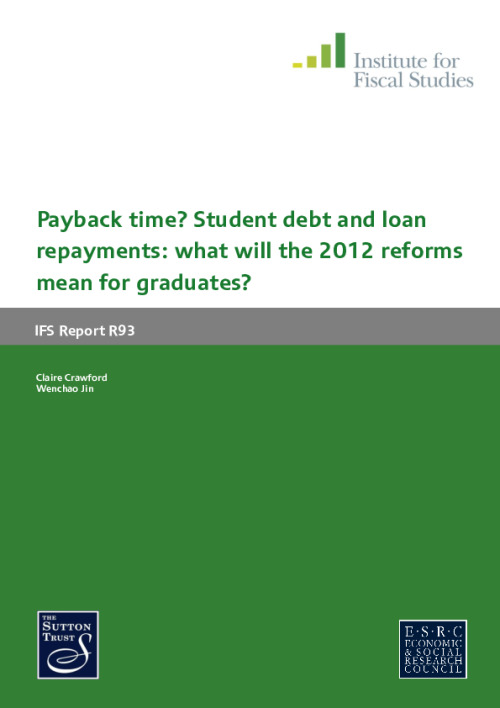Downloads

r93.pdf
PDF | 661.06 KB
This report updates and extends the previous IFS work to examine the consequences of these changes for graduates. In particular, we use a new model of graduate earnings and repayments and explore in more detail the pattern and size of loan repayments made, including by different types of graduates.
Authors

Research Fellow University College London
Claire is a Research Fellow at IFS, working on the determinants and consequences of participation in childcare and education for parents and children.

Research Associate
Wenchao is an Assistant Professor at the University of Sussex and an IFS Research Associate.
Report details
- DOI
- 10.1920/re.ifs.2014.0093
- ISBN
- 978-1-909463-37-0
- Publisher
- Institute for Fiscal Studies
Suggested citation
Crawford, C and Jin, W. (2014). Payback time? Student debt and loan repayments: what will the 2012 reforms mean for graduates?. London: Institute for Fiscal Studies. Available at: https://ifs.org.uk/publications/payback-time-student-debt-and-loan-repayments-what-will-2012-reforms-mean-graduates (accessed: 3 May 2024).
More from IFS
Understand this issue

Public investment: what you need to know
25 April 2024

The £600 billion problem awaiting the next government
25 April 2024

Sure Start achieved its aims, then we threw it away
15 April 2024
Policy analysis

The short- and medium-term impacts of Sure Start on educational outcomes
9 April 2024

Sure Start greatly improved disadvantaged children’s GCSE results
9 April 2024

What you need to know about the new childcare entitlements
28 March 2024
Academic research

6th World Bank/IFS/ODI Public Finance Conference | Driving Progress: Public Finance and Structural Transformation

Higher Education Access and Funding: challenges and policy options

Labour market inequality and the changing life cycle profile of male and female wages
15 April 2024